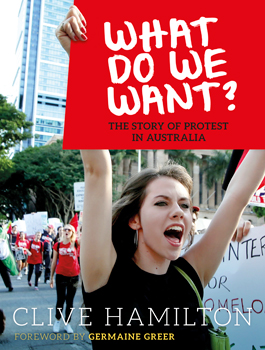What Do We Want?

What Do We Want?
Over the decades, protestors have been instrumental in driving important social movements that define life in modern Australia, yet our colourful history of protest has never been told.
In the forthcoming book, What Do We Want?, author Clive Hamilton shares the stories behind the greatest social movements in Australia: the brave leaders, protest casualties and the vicious retaliation. He examines how movements for equality, peace and environmental action have confronted the ugliness in Australian society and caused revolutionary shifts in social attitudes.
Hamilton also looks at the creativity of our protestors: marching or sitting down in the streets of capital cities; singing at bulldozers in Australia's forests; chaining bodies to buildings; using technology to disrupt stock markets; coming out on television; taking part in vigils, leafleting, street theatre, occupations and many other powerful and disruptive forms of protest.
The book is beautifully illustrated with inspiring and iconic images of protest in Australia, including photos that capture current political leaders in their revolutionary youth.
What Do We Want? honours the passion, courage and commitment of the activists who have sought to make Australia a better place, those who stood up"or sat down"in the face of prejudice or intolerance, and who continue to do so today.
Clive Hamilton is Professor of Public Ethics at Charles Sturt University in Canberra. Previously he was the Executive Director of the Australia Institute, a progressive think tank he founded. He is the author of a number of influential books, including Growth Fetish, Requiem for a Species: Why We Resist the Truth about Climate Change and Earthmasters: Playing God with the Climate.
What Do We Want?
NLA Publishing
Author: Clive Hamilton
ISBN: 9780642278913
RRP: $39.99
Interview with Clive Hamilton
Question: What inspired you to write What Do We Want?
Clive Hamilton: I was approached to write the book by the National Library of Australia, which wants to expose to the public its rich archive of photos and images. Initially I declined – 'too busy", I said. But I kept thinking about it. After a month or so I phoned my contact at the Library and asked if the opportunity were still available. I'm glad it was because writing What Do We Want? was fascinating and inspiring, undoubtedly the most enjoyable book I have written.
Question: Can you talk about the research you did, prior to beginning the writing process?
Clive Hamilton: I have never written a 'picture book" before. It's a wholly different kind of beast. First I began reading all I could about the great protest movements, especially those of the 60s and 70s, then going back and coming forward from there. At the same time – with excellent help from my research assistant Jemma Williams – we searched the NLA's collections for suitable images. Where gaps appeared we looked in other collections. Writing the text around suitable (and available) images was not as hard as I thought it would be. It all fell into place quite easily.
Question: What do you hope readers take from What Do We Want?
Clive Hamilton: The sheer colour, inventiveness and vivacity of the protest story is one of the main impressions. But the book is also a social history of modern Australia. Unless you understand the 'new social movements" that emerged in the 1960s and 1970s you can't really understand how our contemporary society and politics are structured. For example, some of our politicians are still fighting the battles they lost on the campuses 30 or 40 years ago. Why?
Question: Can you tell us about Professor Germaine Greer's piece?
Clive Hamilton: When Germaine Greer agreed to write the book's foreword I wondered what her approach would be. She could have gone anywhere with it. In the end she penned an encomium to the power, and the necessity, of resistance. If we don't resist we cannot be free, because there are always forces out there that will oppress us. I'm thinking now of the increasingly oppressive and undemocratic laws that state and federal governments have been introducing to suppress protest against fossil fuels in Australia.
Question: Why is protest important to drive social change?
Clive Hamilton: As I write in the book: 'Progress does not just happen, as if we are magnetically drawn towards some social utopia. It occurs because a few individuals begin to demand change. They must be determined, obstinate and willing to suffer, because those opposed to change are more powerful and typically react with anger, ridicule and slander." Without protest we would be enslaved.
What Do We Want?
NLA Publishing
Author: Clive Hamilton
ISBN: 9780642278913
Interview by Brooke Hunter
MORE



